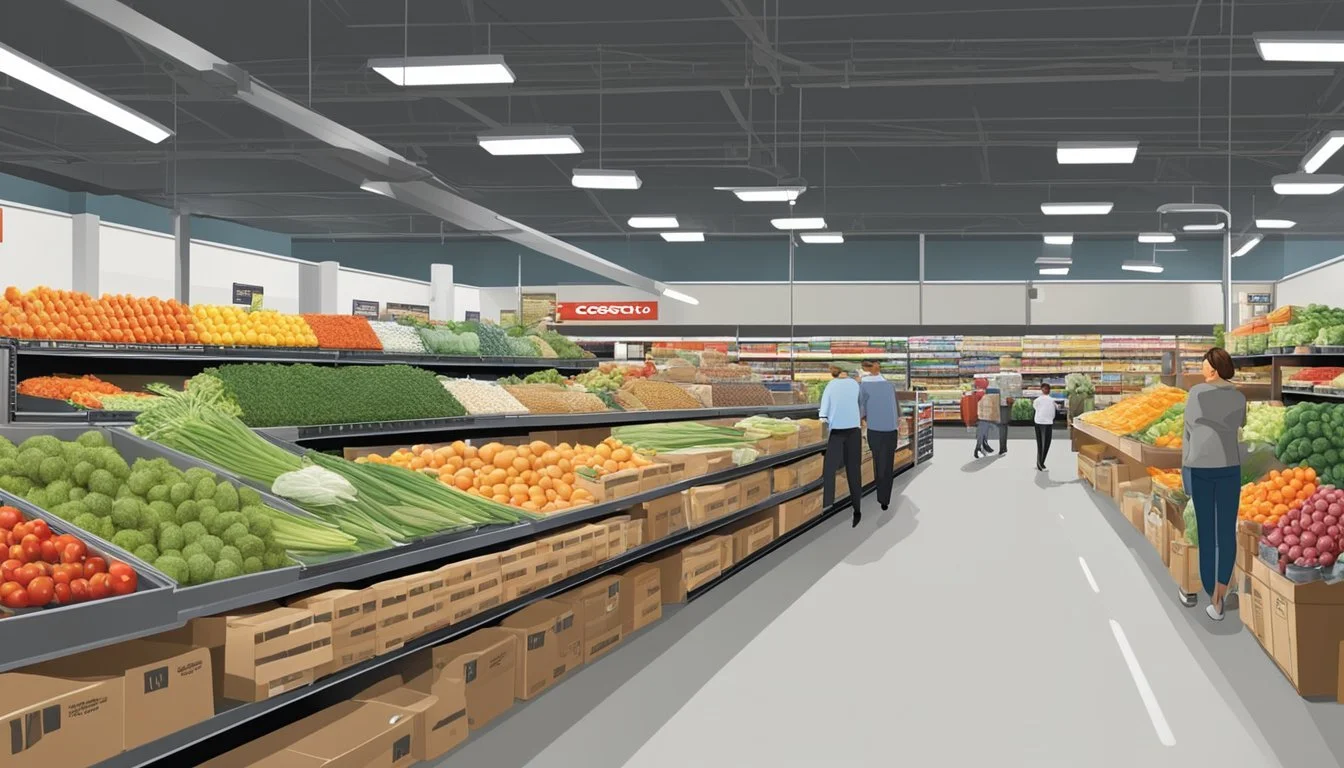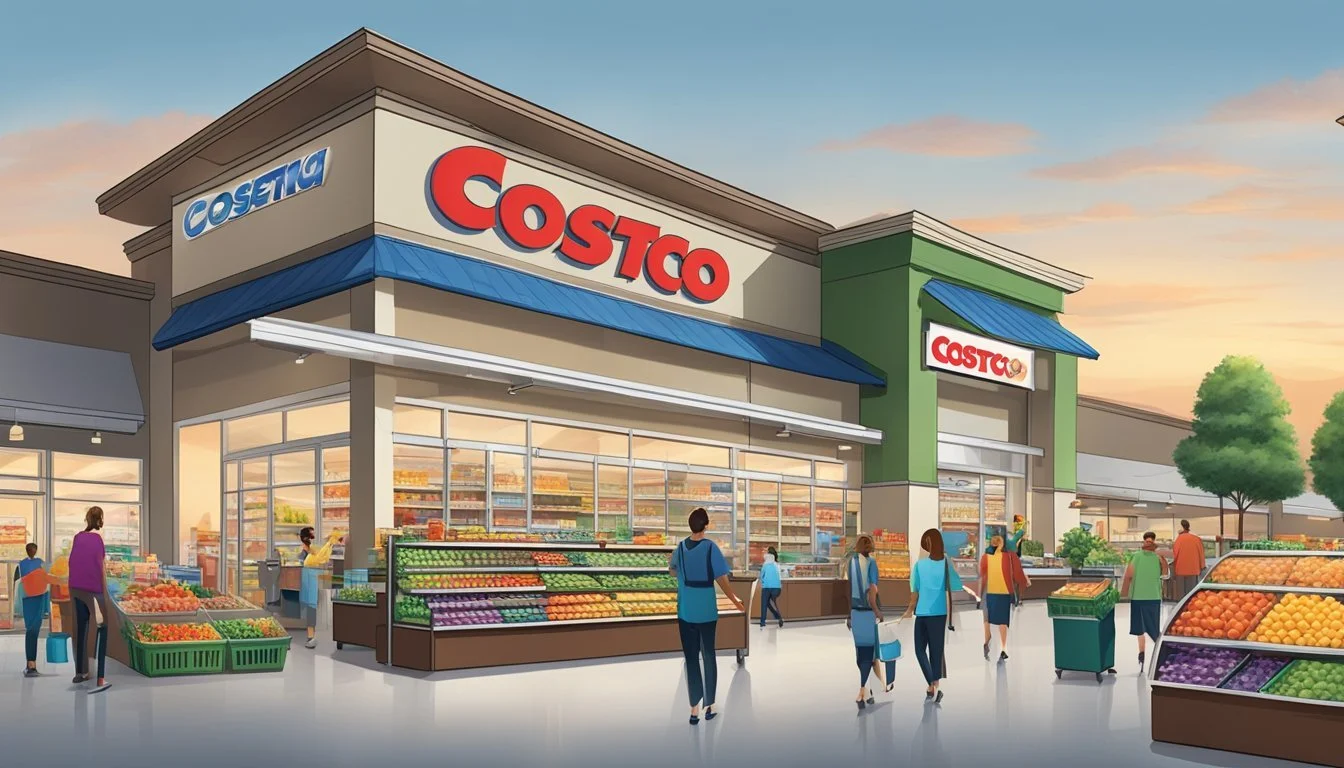Costco vs FoodMaxx
Comparing Prices, Quality, and Selection
Costco and FoodMaxx represent two distinct approaches to grocery shopping, each offering unique benefits to consumers. Costco, known for its bulk purchases and members-only model, provides a wide range of products at competitive prices. FoodMaxx, on the other hand, focuses on everyday low prices for individual items without requiring a membership.
When comparing prices, FoodMaxx generally offers lower costs on individual grocery items, with prices approximately 21% below the average supermarket. This can lead to significant savings for shoppers who prefer to buy smaller quantities or have limited storage space. Costco's pricing model shines when purchasing in bulk, potentially offering greater long-term savings for families or those able to store larger quantities.
Quality and selection also factor into the comparison between these two grocery giants. Costco is renowned for its high-quality Kirkland Signature brand products, which often rival or surpass name-brand alternatives. FoodMaxx emphasizes affordability, which may sometimes come at the expense of premium offerings. Both stores cater to different shopping preferences, making the choice between them a matter of individual needs and priorities.
Company Overviews
Costco and FoodMaxx represent two distinct approaches to grocery retail. Costco operates as a membership-based warehouse club, while FoodMaxx focuses on offering discount groceries without requiring membership.
History and Expansion of Costco
Costco Wholesale Corporation began in 1983 in Seattle, Washington. Founded by James Sinegal and Jeffrey Brotman, it quickly grew from a single warehouse to a global retail giant. Costco pioneered the membership warehouse model, offering bulk products at discounted prices.
The company expanded rapidly throughout the 1980s and 1990s. By 1993, Costco merged with Price Club, significantly increasing its market presence. Today, Costco operates over 800 warehouses worldwide.
Costco's success stems from its unique business model. The company focuses on selling a limited selection of products in bulk quantities. This strategy allows for lower prices and higher efficiency.
History and Growth of FoodMaxx
FoodMaxx, a subsidiary of The Save Mart Companies, launched in 1986 in Bakersfield, California. It was created as a warehouse-style grocery store to compete with larger chains and offer lower prices to customers.
FoodMaxx stores are designed to be no-frills, focusing on providing quality products at discounted prices. The company keeps costs low by having customers bag their own groceries and limiting in-store services.
Since its inception, FoodMaxx has grown to over 50 locations across California. The chain has maintained its commitment to offering affordable groceries without requiring membership fees. FoodMaxx stores typically feature a wide range of products, including fresh produce, meat, and packaged goods.
Membership and Access
Costco and FoodMaxx take different approaches to customer access. Costco requires paid memberships, offering tiered benefits and exclusive perks. FoodMaxx, on the other hand, allows open access without membership fees.
Costco Membership Tiers and Benefits
Costco offers two primary membership levels: Gold Star and Executive. Gold Star membership costs $60 annually, granting access to all Costco warehouses and online shopping. Executive membership, priced at $120 per year, includes additional perks.
Executive members earn 2% cash back on qualifying Costco purchases, up to $1,000 annually. This tier also provides extra benefits on Costco Travel bookings and select services.
Both memberships include:
Access to Costco gas stations
Costco Optical and Pharmacy services
90-day return policy on most items
Free technical support for electronics
Costco members can apply for the Costco Anywhere Visa Card, offering cash back on purchases.
FoodMaxx Access and Lack of Membership Fee
FoodMaxx operates as a traditional grocery store, requiring no membership for entry or purchases. This open-access model allows customers to shop freely without upfront costs or annual fees.
FoodMaxx focuses on providing low prices through a no-frills shopping experience. Customers save money through:
Reduced overhead costs
Self-bagging
Limited customer service
While FoodMaxx lacks exclusive member perks, it offers:
Weekly sales and discounts
Digital coupons
Store loyalty programs in some locations
FoodMaxx's approach aims to make grocery shopping accessible to all customers, regardless of membership status or income level.
Price And Savings
Costco and FoodMaxx employ different pricing strategies to attract budget-conscious shoppers. Their approaches to bulk purchases and everyday low prices can lead to significant savings for consumers.
Overall Price Comparison
FoodMaxx consistently offers low prices on individual items, making it an attractive option for regular grocery shopping. Their everyday low price model typically results in savings of 20-21% compared to average supermarket prices. Costco, while not always the cheapest for single items, provides competitive pricing on bulk purchases.
For staple goods and household essentials, Costco's bulk pricing can lead to savings of 10-30% compared to traditional supermarkets. However, shoppers must factor in Costco's annual membership fee when calculating overall savings.
Bulk Purchasing and Long-Term Savings
Costco excels in bulk purchasing options, offering significant discounts on large quantities. Buying in bulk can lead to long-term savings, especially for non-perishable items and household goods. For example, purchasing 25 pounds of rice at once instead of smaller quantities can save up to 60%.
FoodMaxx, while not focused on bulk sales, provides multi-pack options on some items. Their lower prices on individual products can accumulate savings over time, particularly for perishables and items consumed frequently. Smart shoppers can maximize savings by strategically combining bulk purchases from Costco with FoodMaxx's competitive prices on daily essentials.
Product Range And Quality
Costco and FoodMaxx offer distinct shopping experiences with different product ranges and quality levels. Their approaches to selection and brands cater to diverse customer preferences and budgets.
Variety of Products at Costco
Costco boasts an extensive array of products, from groceries to electronics and clothing. Their food selection includes bulk items, gourmet options, and organic produce. Costco's Kirkland Signature brand spans numerous categories, offering quality alternatives to name brands.
Costco's meat department is known for its high-quality cuts and competitive prices. The store also features a rotating selection of seasonal items and limited-time offerings, keeping the shopping experience fresh for members.
Selection at FoodMaxx
FoodMaxx focuses primarily on groceries, offering a more streamlined shopping experience. Their product range covers essential food items, household goods, and some basic non-food necessities.
FoodMaxx emphasizes cost savings, often carrying a mix of national brands and lesser-known labels. Their produce section typically includes standard fruits and vegetables, with occasional deals on seasonal items.
Quality of Goods: Brand Names vs. Store Brands
Costco's Kirkland Signature products are renowned for their quality, often matching or exceeding that of national brands. These items undergo rigorous testing and are backed by Costco's satisfaction guarantee.
FoodMaxx carries a mix of brand names and budget-friendly alternatives. While their store brands may not have the same reputation as Kirkland Signature, they offer significant savings for cost-conscious shoppers.
Both stores stock fresh produce, but Costco is more likely to offer organic options and a wider variety of high-quality fruits and vegetables. Costco's commitment to quality extends across its departments, including electronics and apparel.
Store Experience
Costco and FoodMaxx offer distinct shopping experiences, each with its own unique features and advantages. Their layouts, customer service approaches, and overall environments cater to different consumer preferences and needs.
In-store Layout and Navigation
Costco's warehouse-style stores feature wide aisles and bulk displays. Products are often stacked on pallets or shelves, creating an open, industrial feel. The layout changes frequently, encouraging shoppers to explore.
FoodMaxx stores are typically smaller with a more traditional grocery store layout. Aisles are clearly labeled, making it easier to find specific items. The consistent arrangement helps shoppers navigate efficiently.
Costco's layout can be overwhelming for first-time visitors but offers a sense of discovery. FoodMaxx provides a more straightforward shopping experience, ideal for quick trips.
Checkout and Customer Service
Costco employs a membership model, which can lead to longer lines at checkout. However, they often have multiple staff members at each register to speed up the process. Self-checkout options are limited.
FoodMaxx offers both staffed and self-checkout lanes, providing flexibility for customers. Lines tend to move quickly due to the focus on efficiency.
Customer service at Costco is known for being attentive and accommodating, with a generous return policy. FoodMaxx prioritizes efficiency, with staff available to assist when needed but less emphasis on personalized service.
Shopping Environment and Consumer Satisfaction
Costco's warehouse atmosphere can be bustling and energetic, especially during peak hours. The store often provides free samples, creating an engaging shopping experience. The wide variety of products, from groceries to electronics, appeals to many consumers.
FoodMaxx focuses on a no-frills environment, emphasizing low prices over ambiance. The stores are clean and well-lit but lack extra amenities. This approach resonates with budget-conscious shoppers who prioritize value.
Customer satisfaction varies based on individual preferences. Costco members often appreciate the quality and variety of products, while FoodMaxx customers value the straightforward, cost-effective shopping experience.
Additional Services and Benefits
Costco and FoodMaxx offer diverse services beyond basic grocery shopping. These range from specialty departments to convenient delivery options.
Costco's Ancillary Services
Costco provides an array of additional services for members. The warehouse club features an optical center with eye exams and discounted glasses. Members can access a pharmacy for prescriptions and over-the-counter medications.
Costco's auto program offers deals on new and used vehicles, as well as discounts on parts and services. The travel agency provides vacation packages and cruise bookings at competitive rates.
Gas stations at many locations offer lower prices for members. Costco also has a photo center for printing and photo gifts.
FoodMaxx's Additional Offerings
FoodMaxx focuses primarily on grocery essentials but does provide some extra services. Many locations feature a bakery with fresh bread and custom cakes.
Some stores have a deli counter offering prepared foods and sliced meats and cheeses. FoodMaxx provides grocery delivery through third-party services in select areas.
The store offers digital coupons through its website and mobile app. Customers can create shopping lists and access weekly ads online.
FoodMaxx provides money services like Western Union transfers and bill pay at some locations.
Impact of Economic Factors
Economic conditions significantly influence grocery store operations and consumer behavior. Inflation and cost fluctuations pose challenges for both Costco and FoodMaxx, affecting pricing strategies and customer purchasing power.
Inflation and Grocery Prices
Rising inflation rates have pushed up food prices, impacting shoppers' budgets. In 2024, grocery costs continue to climb, with staples like eggs, dairy, and produce seeing notable increases.
Costco's bulk-buying model helps offset some inflationary pressures. Their large-scale purchasing power allows them to negotiate better prices with suppliers.
FoodMaxx, as a discount grocer, focuses on maintaining low prices through efficient operations and a no-frills shopping experience. They prioritize affordability to attract budget-conscious consumers.
Both stores have adapted their product selections to include more private-label items, which typically offer better value for shoppers during inflationary periods.
How Costco and FoodMaxx Manage Cost Fluctuations
Costco's membership model provides a stable revenue stream, helping buffer against economic volatility. They leverage their buying power to lock in prices with suppliers, maintaining consistent pricing for customers.
FoodMaxx employs a flexible pricing strategy, quickly adjusting to market changes. They focus on high-turnover items and limited SKUs to keep inventory costs down.
Both retailers have invested in supply chain optimization to reduce transportation and storage costs. This includes building strategic partnerships with suppliers and improving logistics efficiency.
Costco and FoodMaxx also use data analytics to forecast demand and adjust inventory levels, minimizing waste and maximizing savings. These efficiencies help them maintain competitive prices despite economic pressures.
Customer Loyalty and Market Position
Costco and FoodMaxx have carved out distinct positions in the grocery retail landscape. Their approaches to customer loyalty and market strategy differ significantly, shaping their respective places in the industry.
Costco's Loyal Following and Market Dominance
Costco has cultivated a fiercely loyal customer base. The warehouse retailer consistently ranks high in customer trust surveys, often topping lists alongside major brands like Amazon and Kroger.
Costco's membership model fosters loyalty by offering exclusive access to bulk products and competitive prices. This approach attracts families and households looking to save on groceries and everyday items.
The company's market position is strong, with a focus on quality products and customer satisfaction. Costco's private-label Kirkland Signature brand further cements customer loyalty, offering premium items at lower prices.
FoodMaxx's Position in the Market
FoodMaxx targets budget-conscious shoppers with its no-frills approach to grocery retail. The chain positions itself as a low-cost alternative for customers seeking affordable groceries and household essentials.
While not commanding the same level of customer loyalty as Costco, FoodMaxx has carved out a niche in the market. The store appeals to families and individuals looking to stretch their grocery budgets.
FoodMaxx's market strategy focuses on maintaining low prices through cost-cutting measures like a bag-your-own-groceries policy and minimal store décor. This approach allows them to offer prices up to 21% lower than average, attracting price-sensitive customers.
Conclusion
Costco and FoodMaxx offer distinct advantages for grocery shoppers. Costco excels in bulk purchases and high-quality products. Its membership model provides access to exclusive deals and services.
FoodMaxx focuses on everyday low prices without membership fees. It appeals to budget-conscious customers seeking regular grocery items at competitive rates.
Both stores have loyal customer bases. Costco attracts families and businesses looking to stock up. FoodMaxx serves individuals and households seeking affordable weekly shopping.
The choice between Costco and FoodMaxx depends on shopping habits and preferences. Costco suits those who can store bulk items and value premium offerings. FoodMaxx is ideal for frequent shoppers prioritizing consistent savings.
Ultimately, savvy consumers may benefit from utilizing both stores. This strategy allows them to leverage the strengths of each supermarket, maximizing value across their grocery needs.









